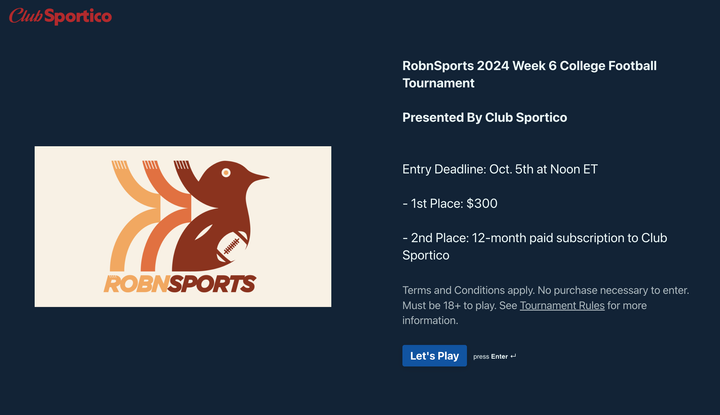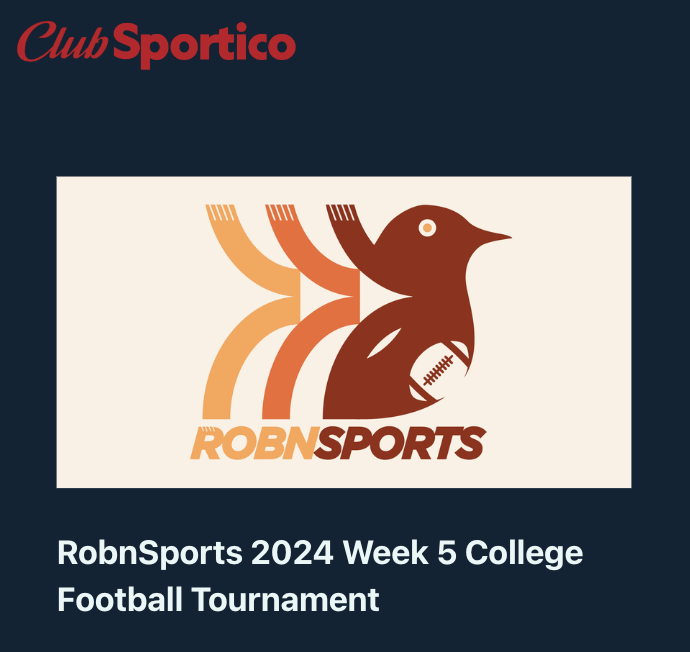CFB '23 - Week 13 Preview
The conclusion of our three-part series comes on college football's biggest rivalry weekend.
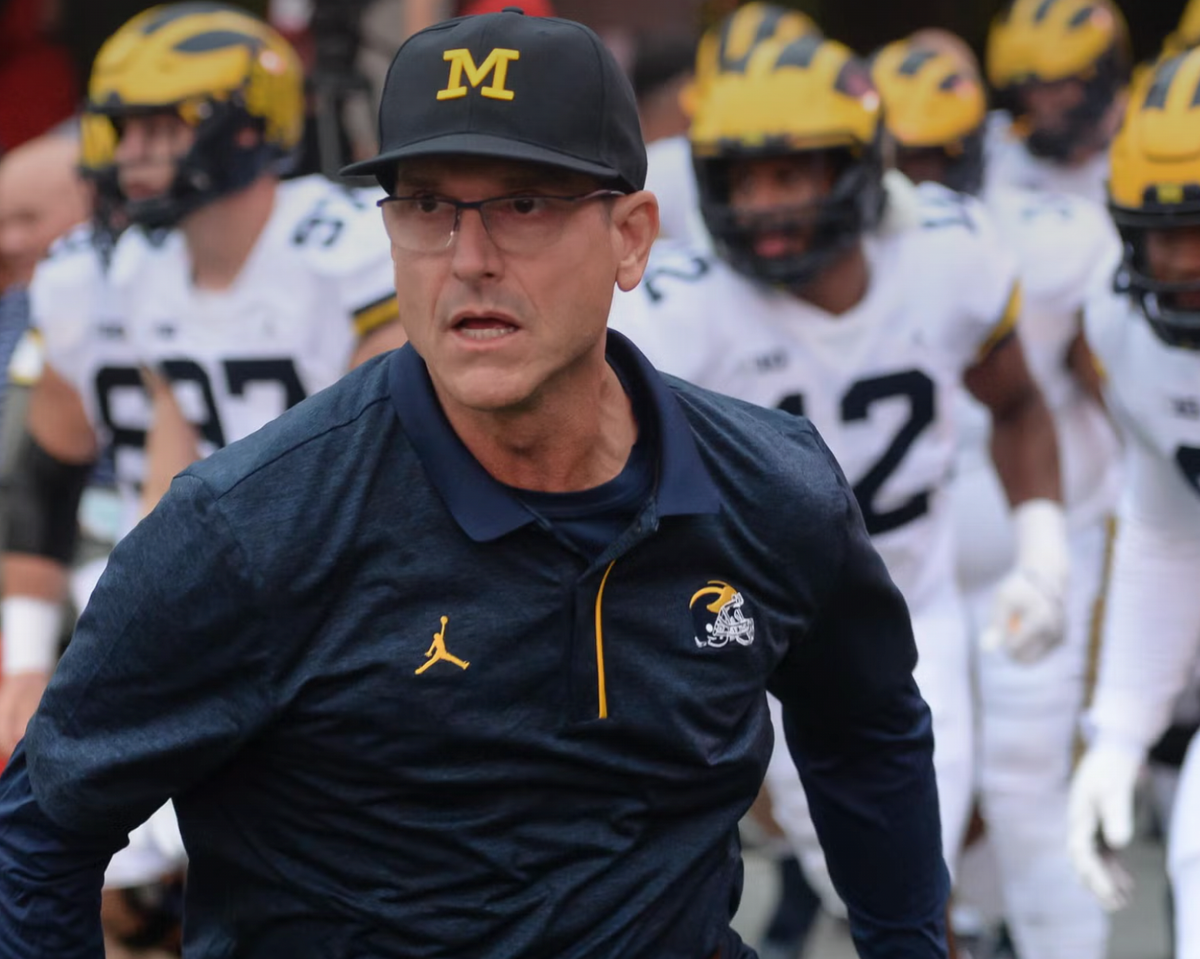
The Fuzzy Morality Of Taking What You're Presented With - Pt. 3
-
Massive Rivalry Weekend Includes Michigan-Ohio State, Oregon-Oregon State, Florida State-Florida, Alabama-Auburn… BYU-Oklahoma State?
-
All Eyes On Whether Bertolina, Olsen Blink First
-
Handful of 3000+ All-Ins Expected From Pursuers
-
What If Play-Calling Data Was An Official Statistic?
This Doesn't Belong To You
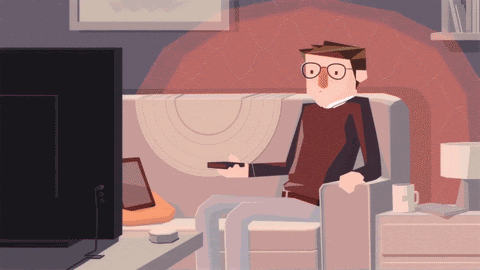
Perhaps lost in the chaos of the initial spectacle of the Michigan sign-stealing scandal, SI.com, which purports to be a functioning media organization, published a story illuminating text messages between Connor Stalions and a U of M student.
Stalions confirmed in the text exchange that some time prior to 2021 he, “Stole opponent signals during the week watching TV copies then flew to the game and stood next to [Michigan offensive coordinator Josh] Gattis and told him what coverage/pressure he was gettin.”
The exchange, if accurate, reveals one thing and suggests another. It reveals that what Stalions stole was so public that he did it by, at least partially, watching games on television. It suggests that, as part of what SI.com termed his, “elaborate scheme to place unnamed associates of his in stadiums of Michigan’s opponents,” perhaps he was using students to compile his information.
Parts 1 and 2 of this series detailed how the random people in the stands obtaining live betting data for unauthorized companies often are often students. One cannot help but wonder the same with the Michigan scandal — why else would Stalions be bragging to an existing student of the institution about his successes were the student not at least somewhat interested in taking up the cause?
We’re more interested in the reveal than the suggestion. The part about TV. Stalions didn’t even have to send people (of any age) to games on his behalf in order to obtain the information he needed. He could rip it straight from broadcast — the act of which doesn’t appear to be a violation of NCAA bylaws, in part because it would be pretty stupid to mandate that a team can’t “use” what it sees on TV. All film scouting would cease to exist overnight.
Others in the college football community agree that all you need to crack teams’ signs code is a YouTube TV subscription. From WaPo: “‘Anything that happens in the public eye hasn’t gone too far,’ an unnamed coach with Big Ten and SEC experience told ESPN this week. ‘To be honest, I can watch TV copy of two to three games and get everything I need.’”
Right. It’s almost like it’s public information that’s uncontrollable.
This logic didn’t assuage the non-Michigan Big Ten coaches prior to the punishment announcement against the Wolverines. They reamed out Tony Pettiti for not acting more quickly to address the situation. The subtext: We all know that Michigan is doing this and they’re the villain. Why don’t you do something?!
Hours later it was revealed that someone had presented Michigan, the perp, with detailed evidence that other teams had stolen Michigan’s signs
And, so, Michigan responded with its own: “Yeah, Pettiti, why don’t you do something?”
The situation speaks not just to the futility of punishing some people and not others for an activity that, if Michigan and others are to be believed, everyone does.
It speaks to the futility of rules, policies, etc. on the books that prohibit the use of information for certain purposes when everyone already has the information, when that information is in people’s brains.
Are you going to look into people’s brains and see how it travels through the various neural pathways and police how or if it’s being utilized?
Commish, we have George Orwell for you on Line 1.
This isn’t Watergate. Teams aren’t sending people to break into fortified offices and rifle through an opponent’s private files. What’s being stolen is on display for 80,000 fans — for TV spectators — as long as they know where to look.
We believe there is no merit in private bodies’ belief that they can enforce how you use information that they’re volunteering to you in the public sphere, because the “use” of information is cerebral. It is a mental matter.
Moreover, we don’t believe it’s different when it’s a team trying to use that information vs. when it’s a private business trying to use that information, nor whether its use is for commercial gain vs. competitive gain.
Do You Really Want To Pull This String?
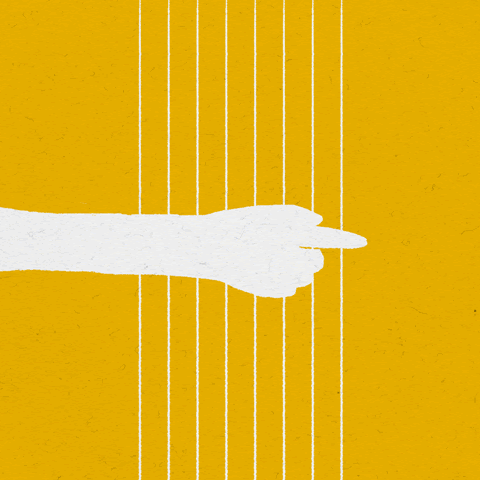
In 1996, the NBA sued Motorola. The league alleged that a pre-internet product Motorola developed, which relayed to people real-time NBA stats and scoring information (imagine if you put the ESPN ticker on a pager that you wore on your belt), infringed on the league’s copyright on the broadcasts of its games, and misappropriated league data.
The court ultimately did not find in the NBA’s favor, and its ruling allowed Motorola to market and sell its product because, as it found, the NBA did not have exclusive rights to factual information generated by its games.
The case became one frequently referenced by enthusiasts of the fact that sports leagues don’t have a legitimate claim of ownership over the statistics and data from their on-court products.
This has not stopped leagues from asserting that they have protection over the statistics derived from their member clubs’ events. I would cite specific examples, but several of them have come during in-person interactions with the leagues where large henchmen have stood by the door, glowering, with a billy club in their hands.
(Note: Leagues and individual teams have since softened their colloquial stance to the more watered-down, “we provide the content that allows for wagering in the first place.” When they say that to you, that means you’re supposed to pay them.)
So, let’s pull this string. If play-calling data pertains directly to the contests the leagues believe they have copyright protection over, if it pertains directly to the numeric final scoring result of the contest on the field, if it is obtained in the same ways — by kids with phones in the stands or by people watching on TV — that statistical and play-by-play data is obtained, if it is also publicly available during the course of gameplay to anyone with eyes, then why isn’t play-calling data treated by the NCAA, or by any league, like another form of statistical data? And why wouldn’t the NCAA claim ownership over this type of data, as well?
One can hear the objections already:
One potential red-herring answer: There is no legitimate media, betting or other public demand or public marketplace in which one can re-sell the consumption of play-calling data. Therefore, the NCAA or others wouldn’t lay claim to it because there is no financial upside for them to do do.
I love how cynical this is. But it is also wrong. How can one make this argument when micro-betting companies tout the next great “innovation” in betting as being markets for whether the next play will be a run or a pass? Or whether the next pitch will be a ball or a strike? And even if one ignores this evidence, who said that the demand for that data had to be public?
A second potential red herring answer: The only theoretical “customer” of said data is an NCAA institution itself.
Teams purchase videographic and statistical data all the time for analytical and other purposes. They are obviously hungry for this play-calling data, as well. So hungry that they’re willing to break rules to obtain it. Even if we don’t dispute the fact that the only customer would be teams themselves, why are teams not legitimate customers?
A third answer: Those collecting the data have no idea what the play calls (a four-box with random iconography from pop culture) or play signals (a series of muppet-like gestures) mean, so therefore the collectors would be unable to synthesize any of it into meaningful insights.
That’s OK. The data-capturing companies just need to record what the signals actually are. They are data providers. They are not meaning-providers. The interpretation of the data that is brokered should primarily be left to the end-consumer.
A fourth answer: Well, the commoditization of play-calling data into a statistic, regardless of customer base, regardless of the intelligibility of the data, might lead to no one making visible play calls any longer.
OK. So the college ranks become less college-y and more like the NFL. We’re already paying players and shipping Stanford off for three weeks at a time to play in-conference foes Virginia, Duke and North Carolina State. That ship has sailed.
The more you peel back the Onion (see what we did there?) fewer and fewer of these reasons hold up.
Letters To Charlie
So, let’s extend it even further, like Tom Cruise going from Mach 9 to Mach 10.
If play-calling data is functionally the same thing as statistical data, and if the NCAA or any other league has a longstanding tradition of really wanting you to think that they own and control the rights to it, then why isn’t it subject to the same dissemination structure as other leagues’ play-by-play data (i.e. through an exclusive third-party distributor like Sportradar or BetGenius)?
Why isn’t the NCAA trying to monetize this play-calling data, as they will surely do in due course with their betting data (lest conferences beat them to the punch)?
Why is there not the same hand-wringing about the sanctity and accuracy of play-calling data as there is about betting data?
Well, Commish, it’s because you’re not supposed to use play-calling data, because using it feels like your team cheating against my team, or like my team cheating against your team. Using it feels like it would erode the integrity of everything we’re watching.
In other words, it’s because we all have to pretend like it is data that market participants don’t use.
And we have to pretend this, even when the data itself is thrown in our face, on our televisions, broadcast to millions.
Doesn’t that seem a bit silly?
Everyone loves to dogpile on the NCAA for actions that, to many, disadvantage individual athletes while being done in the name of protecting athletes.
The crux of those complaints center on the NCAA’s enduring belief - and insistence that you share said believe - in the myth of amateurism in college sports when clearly, little is amateur about college sports any longer.
The same parallels exist here. The ecosystem of college football is insisting you believe only one or two bad actors steal signs, that those actors can be sought out and punished effectively, that these are complex matters that aren’t discernible to just anyone with a TV connection, when clearly, little about this is complex and everyone does it - punishment simply goes to whoever is revealed and shamed first.
Just because everyone does an activity, it doesn’t make that activity correct, desirable, righteous, legal, etc.
But it’s different when 1) the body penalizing the activity is the key catalyst in goading the activity, 2) a critical mass of the ecosystem participates the activity, 3) the activity isn’t easily identifiable and enforceable, 4) the activity involves people’s own mental thoughts and analysis, which you will never be able to conclusively prove result in specific actions.
You can’t stop people from acting on play-calling information they obtain from a broadcast just like you can’t stop a guy from betting $20 at his local bar.
So, ironically, much as the sports betting industry rallied around the cry of, if-you-can’t-beat-em-join-em in their attempt to lobby for the repeal of the federal ban on sports betting, maybe it’s time to take a look at commoditizing play-calling data.
What if the NCAA created a framework that levels the access to play-calling data, and that gives the live-TV rewind button a break / stops encouraging random college kids to surreptitiously record stuff.
It would be highly imperfect. Again, who “owns” play-calling data and has the rights to sell it, how it’s disseminated, etc., are questions left to far smarter minds.
But doing so can’t be any messier than the creation at the league level of the ecosystem around the “ownership” and dissemination of official statistical and betting data.
We’re sure Charlie Baker will get right on it.


